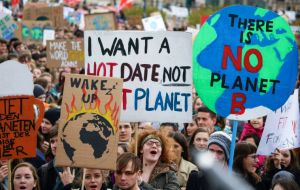MercoPress. South Atlantic News Agency
Classroom emptied as students in the world demand action on climate change: “you're destroying our future”
 In Stockholm, Swedish teen activist Greta Thunberg who inspired the protests, warned that time was running out. (Pic: Svante Thunberg/Twitter)
In Stockholm, Swedish teen activist Greta Thunberg who inspired the protests, warned that time was running out. (Pic: Svante Thunberg/Twitter)  Across the world placards inspired: “Like the ocean, we will rise”; “Our future in your hands”; “System Change not Climate Change”; “Don't be a Trump”
Across the world placards inspired: “Like the ocean, we will rise”; “Our future in your hands”; “System Change not Climate Change”; “Don't be a Trump”  German Minister Peter Altmaier said demonstrators should be in class; Australia's minister Dan Tehan said striking was “not something that we should encourage”
German Minister Peter Altmaier said demonstrators should be in class; Australia's minister Dan Tehan said striking was “not something that we should encourage”  But New Zealand Prime Minister Jacinda Ardern hailed the action, saying: “We hear you and we're getting on with setting a path for carbon neutrality.”
But New Zealand Prime Minister Jacinda Ardern hailed the action, saying: “We hear you and we're getting on with setting a path for carbon neutrality.” UN Secretary General Antonio Guterres offered his strongest support yet for the strikes, “Without ambitious action, the Paris agreement is meaningless.”
UN Secretary General Antonio Guterres offered his strongest support yet for the strikes, “Without ambitious action, the Paris agreement is meaningless.” Hundreds of thousands of young people skipped school across the globe on Friday, 15 March to march through the streets for an international day of student protests aimed at pushing world leaders into action on climate change.
Classrooms in capitals from Bangkok to Berlin and Lagos to London emptied as organizers of the student strike called demos in more than 100 countries.
Students flooded into the streets across Europe, North America and Asia carrying placards reading: “There is no planet B”, “You're destroying our future” and “If you don't act like adults, we will.”
Despite three decades of warnings, carbon dioxide emissions hit record levels in 2017 and again last year.
Loading the atmosphere with greenhouse gases at current rates will eventually lead to an uninhabitable planet, scientists say.
In Stockholm, Swedish teen activist Greta Thunberg who inspired the protests, warned that time was running out.
“We are living through an existential crisis that has been ignored for decades and if we do not act now it may be too late,” the 16-year-old told Swedish public television station SVT.
Writing on Instagram, Thunberg - who has been nominated for the Nobel Peace Prize for her activism - estimated more than 10,000 youngsters had joined the Stockholm protest.
Across the world, their placards formed a mosaic:
“Like the ocean, we will rise” (Sydney)
“Our future in your hands” (Berlin)
“System Change not Climate Change” (Vienna)
“Don't be a Trump” (Hong Kong)
“The Titanic would have NO problem in 2019” (Elmshorn, Germany)
And everywhere, “There is no planet B.”
Montreal drew among the largest crowds, estimated by organisers at nearly 150,000.
“When you have winds of change, demanded by young people like this, governments have a moral duty to listen and act on the environment,” Montreal university student Cedric Remy said.
In the United States, protests were more low-key, with events held in New York, Washington, Chicago, Portland, Oregon, and St. Paul, Minnesota, where one sign read: “So bad even introverts are here!”
In Delhi, one of the world's most polluted cities, 200 students took part in a colorful protest, waving ribbons, juggling and performing stunts with hoops.
“We have to make a choice whether we want to sit and be indifferent or do something for our planet,” said 16-year-old student Srijani Datta.
In Sydney, 18-year-old Charles Rickwood warned that Australia's famous Great Barrier Reef could be destroyed.
“If current trends in the environment continue, we'll see the one, two degrees increase in our ocean then it will simply become unsustainable and we could lose the entire Great Barrier Reef,” he commented.
European students were also out en masse. Several thousand youngsters thronged the streets of central London in a raucous demonstration with banners and placards.
Packing into Parliament Square, they cheered and chanted “Change... now!” before marching past Downing Street and massing outside Buckingham Palace.
It is estimated that more than one million marched overall, according to organizing groups such as the Youth For Climate movement. The Friday for Future movement said more than 300,000 young people demonstrated in Germany alone.
Germany's Economy Minister Peter Altmaier said the demonstrators should be in class while Australia's Education Minister Dan Tehan said striking was “not something that we should encourage.”
But New Zealand Prime Minister Jacinda Ardern hailed the action, saying: “We hear you and we're getting on with setting a path for carbon neutrality.”
UN Secretary General Antonio Guterres offered his strongest support yet for the strikes, writing in the Guardian newspaper: “Without ambitious action, the Paris agreement is meaningless.”
Guterres also called for world leaders to come to the Climate Action Summit in New York in September “with concrete, realistic plans” to further reduce their emissions by 2020, in order to reach a target of 45 percent lower emissions over the next decade, and to net zero by 2050.
Greenpeace praised the global protests, saying adults needed to learn a lesson.
The Paris treaty calls for capping global warming at “well below” two degrees Celsius (3.6 degrees Fahrenheit) but the planet is currently on track to heat up by double that figure.
The UN's climate science panel warned in October that only a wholesale transformation of the global economy and consumer habits could forestall a catastrophe.




Top Comments
Disclaimer & comment rules-

-

-

Read all comments(Note to meself)...
Mar 16th, 2019 - 10:22 am 0I must have a serious talk with them grandchildren...
I absolutely want a great grandflicka as Greta..., pronto...!
LOL. How old are your grandchildren, Think?
Mar 16th, 2019 - 09:23 pm 0UK is currently (21:22 GMT) getting 31.04% of power from wind. Guess how much from solar? ;)
Discontinue that ride in the 4x4 to school, discontinue the skiing trip and the package holiday, walk, cycle and public transport everywhere, no more MacDonalds and see what they say then?
Mar 17th, 2019 - 01:13 pm 0Commenting for this story is now closed.
If you have a Facebook account, become a fan and comment on our Facebook Page!